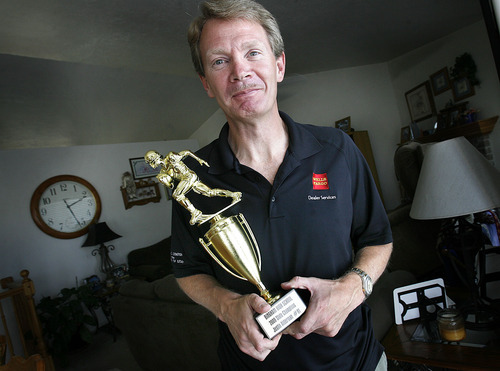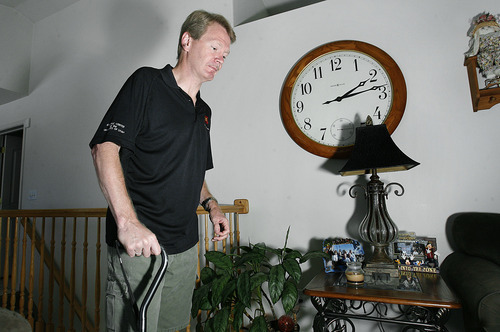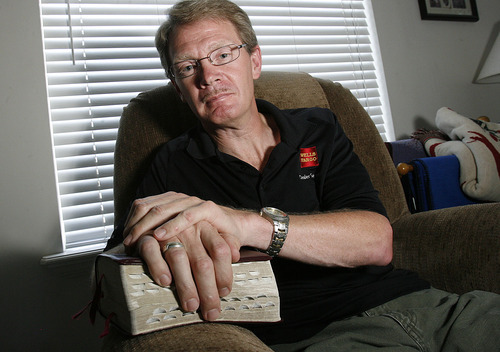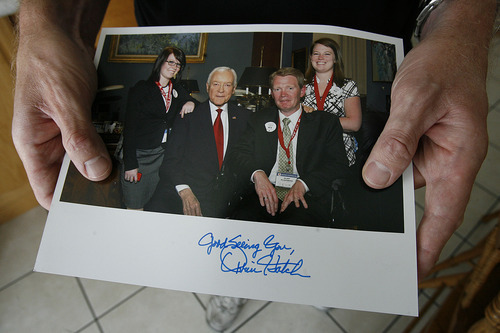This is an archived article that was published on sltrib.com in 2011, and information in the article may be outdated. It is provided only for personal research purposes and may not be reprinted.
When golfers swing for the green next week at Stonebridge Golf Course in West Valley City to raise dollars for amyotrophic lateral sclerosis research, Alan Alderman will be watching.
When health professionals from around the globe converge on Sydney in November to hear the latest research on the care and support of ALS patients, Alderman will be a presenter.
And when the ALS Association convenes its annual policy conference in Washington, D.C., next May, Alderman will attend, as he has six times in the past.
Choose a cliché — go-getter, man of action, mover and shaker — and it fits Alderman, who at 50 has lived with ALS, or Lou Gehrig's disease, since 2001. Because Alderman was diagnosed with bulbar-onset ALS, which opens patients to the risk of choking or pneumonia because the muscles that control swallowing are affected, doctors expected him to die in two to four years.
"Obviously, it's devastating when you have a doctor tell you that you have a disease that they do not know what causes it, and they do not have any real effective treatment for it, and will eventually take your life," Alderman said.
Ten years later, he is alive and, for an ALS patient, doing reasonably well. Medically, the explanation seems to be that the disease has ravaged only the motor neurons in his brain and has left the neurons in his spinal cord largely alone, said Mark Bromberg, Alderman's neurologist.
But there is a personality component that sheds light on Alderman's remarkable longevity, which Bromberg and his patient readily allow. Alderman never turned inward. He refused to believe his fate was out of his control.
"I never thought that he felt sorry for himself. In some sense, he is making this his career," Bromberg said. "He was quite a remarkable person to begin with, and this [disease] has fine-tuned that."
Alderman was born in Salt Lake City and raised in Logan, where he went to school and later attended Utah State University. After graduating, he took a job at a bank in California, got married and started a family.
He was laid off in 2000 when the bank downsized. He found another job, but the bank wanted him to move to a division office in Salt Lake City. Alderman was happy to move. He and his wife would be close to his parents and sister. His children would be near their grandparents and an aunt.
"We moved in this house [in South Jordan]. The home was new. We were working on getting settled into the home. I was enjoying my job," Alderman said last week.
In January 2001, Alderman noticed something odd. His speech was slowing down and he was having trouble swallowing. He didn't seek out a doctor for several months.
When he did, his primary physician sent him to a neurologist in Salt Lake City, who said Alderman had ALS. Wanting a second opinion, Alderman went to Bromberg, who confirmed the diagnosis. The manifestation of his ALS was unusual. Bulbar is aggressive. Initially, it affects only 30 percent of ALS sufferers, though almost every patient eventually shows bulbar-like symptoms.
"I said [to myself], you have a decision to make," Alderman recalled. "You can let ALS take your life, or you can take whatever time God will give me and try to make a difference, and try to live every day to its fullest."
One of his first efforts was fundraising. Mostly through his efforts, the first ALS golf tournament was held in 2002. Over the years, the tournament has raised $300,000 for ALS research. This year's tourney is set for Aug. 18.
"Alan's really kind of the spearhead on it. He's the guy who started it roughly 10 years ago," said David Gooch, a consumer loan underwriter with Wells Fargo Dealer Services, Alderman's former employer until 2003, when it was no longer possible for him to work. Wells Fargo is sponsoring the tourney with the Muscular Dystrophy Association.
"He's a fighter. Based on the time when he was diagnosed, the majority of people [with ALS ] have passed on," Gooch said. "Even though his body has given out on him, he's still [with us]."
It's clear that Alderman lives by his message to other ALS patients. Whenever possible, he tells them to take responsibility for their lives, stick up for themselves and never give up. Alderman lives alone in his house, which is spotless (his wife left in 2009; their divorce will be final later this month).
He still has a driver license; earlier this year, he drove to Houston to attend a family wedding. He currently serves a part-time mission for his church, lectures medical students on ALS and participates in experimental drug tests.
He even heads up a study that he hopes will prove that, if ALS patients are actively involved in ALS-specific activities, they will improve their quality of life.
It's that research that Alderman will present in Sydney later this year.
Twitter: @SLTrib.com —
ALS golf tournament fundraiser
P Proceeds benefit Muscular Dystrophy Association's ALS Center at U. of U.
When • Aug. 18
Where • Stonebridge Golf Club, 4415 Links Drive, West Valley City
To register or for information • Call Sarah Berry, 801-278-6200









